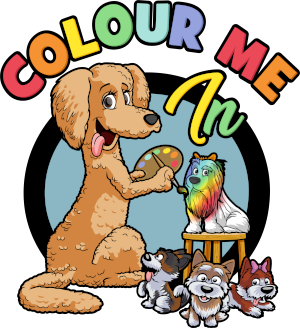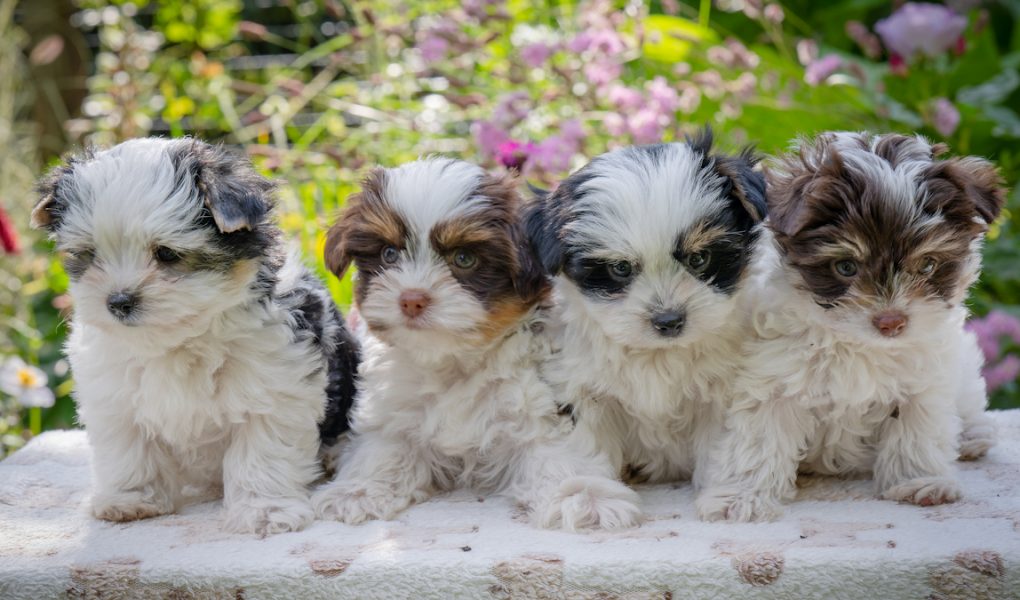Having had to take early retirement due to a number of health issues I am now a full time “pawent” to our little family of four legged furbies.
The two legged kids have since flown the nest to forge their own path in the world and I now have the great fortune despite my disability to be able to combine the activities I love best; my dogs, gardening and photography in the comfort of my home.
Being at home full time, gives me the opportunity to dedicate the time that our dogs and their puppies need on a daily basis, be it day or night.
Our ladies are whelped in our bedroom where they remain until I am confident that their puppies are strong enough not to get into difficulty during the first critical days of coming into the world.
By the time the puppies eyes are open mum needs more time away from her puppies so moving them into the nursery quarters in the conservatory allows me to tend to the mums need to join her puppies when they are in need of her to nurse.
When our puppies start running around they are given the freedom to join the other members of the family outdoors in the garden, which is most of the day, when weather permits. This provides a fabulous opportunity for the puppies to discover the great outdoors with confidence having their mum and siblings by their side.
We always allow the mums to self wean her puppies. The puppies are introduced to Eukanuba dry puppy kibble as their teeth come through but the majority of our pups are still nursing from mums until around ten weeks or more. Eventually mum says enough, no more! Her interaction with the puppies then transitions from nurse maid to play mate and educator and she will teach her pups a wide array of skills primarily how to defend themselves by play fighting. This is an invaluable time for a puppy’s primary socialisation.
Health Check & Vaccinations
During the weaning transition period the pups are still protected by their mothers antibodies but with natural weaning taking place at around 10 weeks it’s time for the puppies to receive their first core vaccines, health check and microchip. The core vaccine (DHP) protects puppies against Distemper, Hepatitis & Parvo. They will also receive their first Leptospirosis (L2) vaccine.
In vaccinating our puppies at ten weeks as opposed to eight weeks there is no need for the puppies to receive a second DHP core vaccine which reduces excess stress on their tiny little bodies, they will however receive their 2nd vaccination for Leptospirosis within 2-4 weeks. The DHP vaccine booster is not required for a further three years. The Leptospirosis booster can be given annually.
I assess whether or not a puppy is ready to start the next chapter of their lives on an individual basis. The smaller puppies remain with us for a minimum period of twelve weeks whilst the larger puppies can join their new families 48hrs after having completed their first Core Vaccines.
We encourage families to visit several times when possible prior to taking your new puppy home.
Departure Day
On collection of your puppy we advise that you bring clean towels, wet wipes and kitchen roll as puppies are often sick or potty when travelling in the car for the first time.
You will be provided with a Eukanuba Puppy pack containing your puppy’s food, a blanket or basket with mum and siblings scent, your puppy’s vaccination records, a copy of pedigree and documents pertaining to your free four weeks insurance policy with Pet Plan.
We ask all new “Pawents” not to come earlier than the prearranged appointment time. We understand your excitement and share it with you but we need to prepare your puppy’s paperwork, bath & groom as well as tending to all of our daily chores prior to your arrival. If travelling long distance and are ahead of schedule there are lots of cafes in Crieff for a coffee break.
Deworming
Our puppies are dewormed with Drontal Puppy Suspension at two weekly intervals. From twelve weeks onwards we incorporate a variety of natural foods into our dogs and puppies diet, all of which provide natural intestinal parasite control: pumpkin seeds are an extremely effective deworming agent because they contain an amino acid called cucurbitacin. Coarsely chopped carrots scrape the walls of the stomach and gut as they are digested removing the mucus and any parasites that are within it. Other effective foods include but not limited to are turmeric, coconut, dried, grated or oil.
Parasite Prevention
As Yorkshire Terries often have sensitive skin we use C&G organic medicated flea shampoo and coat spray to help protect against biting parasites. We do not administer prescribed chemical ingestible chews which contain pesticides such as Nexguard and Bravecto to control biting parasites due to the risk of medication intolerance which can result in side effects including seizures, vomiting and possibly death.
Grooming & Daily Care
We introduce our puppies to regular handling & grooming from a very early age. The coat of the Yorkshire Terrier is similar to human hair as opposed to fur. Like us, they do shed hair minimally but do not cast or molt with the changing of the seasons.
Your puppy will require daily grooming to help maintain a healthy glossy coat. A ten minute brush to remove any tangles or knots. A weekly bath will help remove the build up of grease and dirt, urine or fecal matter making daily brushing easier and as mentioned previously will help protect your pooch from parasite infection.
Period Of Adjustment
Introducing your puppy into your home will require a period of adjustment which normally takes a few days.
We recommend that you are best to decide where your puppy will sleep and stick with that regime. So if you are happy for your puppy to sleep on your bed then provide a waterproof blanket. Some new puppy owners prefer to have their puppy in a crate in the bedroom, whilst others prefer to have a crate in another room in the house. There are a few things you can offer your puppy if they are to sleep away from you such as placing an old fashioned ticking clock that mimics the sound of the heart, their cuddle blanket provided by us, a piece of your worn clothing can also offer comfort.
Toilet Training
Your puppy has spent the night in a crate with his siblings, when opened in the morning our puppies go outside immediately for their first potty of the day. They have their last toilet at approximately 11pm.
Your puppy will always pee moments after they awake. We recommend that you pick your puppy up upon wakening rather than allowing them to make their own way as there is a high probability that they will squat and piddle before they reach the door.
We do not use puppy pads as being allowed to potty indoors can prove a difficult habit to break as they learn that toileting in the house is acceptable and one of the principle reasons small breeds have earned the reputation of being difficult to toilet train. Their bladder is no smaller pro rata to larger breeds.
Your puppy is likely to poop shortly after eating and will need to go out to toilet. Always offer lots of praise after the deed is done and reaffirm the word “potty”. If you notice your puppy, sniffing and circling and starting to “hunch” a quick loud clap to distract attention, then carry your puppy outdoors. Your own dedication and commitment to your puppy’s toilet training is essential for successful toilet training.
Harness & Exercise
We recommend you take your puppy with you to choose and fit a harness that is well adjusted to your puppy. We do not recommend collars and leads as the neck of the puppy is very small and vulnerable.
Your garden will provide more than sufficient space to exercise your puppy for the first few days or weeks, however they can go out for walks as soon as you take them home as they are fully vaccinated. Small breeds are an ideal choice for people with restricted mobility like myself as they adapt very well to life at home with a garden, it’s also ideal when weather is wet, frozen and hazardous.
Feeding
All of our puppies are fed adlib, that is to say they have access to food and water at all times. Small breeds are prone to Hypoglycemia so need a regular supply of calories. If adlib feeding is not an option due to another dogs feeding regime hand feed regularly in between meals. Fresh cooked chicken is a good source of protein and calcium but be sure not to use prepacked salted supermarket packets.
Small breeds do tend to have sensitive stomachs, so stick to the same, dry food we have provided you with. If you do decide to change brand we recommend you visit the www.allaboutdogfood.co.uk website first. If you do change always introduce the food gradually. Stick to dry food as wet food can increase the likely hood of gum disease and tooth decay.
Your puppy can also have a wide variety of foods added to his/her food, cooked chicken, boiled rice, sweet potato and vegetables but introduce one at a time. Raw bones are excellent for you puppies dental care, chewing raw bones helps remove tartar build up. Never give your puppy cooked bones, as these will splinter and can cause serious internal damage.
Support
If ever you ever feel in need of advice never hesitate to contact me no matter how insignificant your feel it may be. I am always happy to keep in touch and answer any questions you may have.













































































